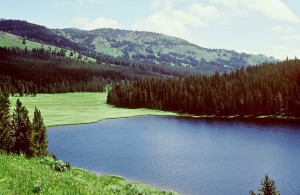Part One: Introduction *
This new series of blog articles is based on my book of the same name, published in 2012 by Kregel Publications. The articles will explain and defend the biblical teaching that God gave the human race stewardship responsibilities in creation, and how this plays out in practical, theological, and ethical dimensions. I will also refute the claim that non-Christian religions and secular environmentalists are better equipped than Christianity to formulate environmental ethics and guidelines for environmental stewardship. I can’t cover my entire book in this series of articles, and will leave out almost all of four chapters and large portions of the others. Probably 90 percent of my quotes and references from Bible scholars who have studied this issue will also be omitted in these articles. So, if you want the “rest of the story”—including my personal journey from an active non-Christian environmentalist to an enthusiastic Christian environmental ethicist—you will need to purchase the book. It’s available in both paperback and Kindle. With this said, let’s get started.
This may surprise Christian readers, but in recent years there has been a growing concern among evangelicals and other conservatives over Earth’s mounting environmental problems. In part, this is because diverse political and scientific views on climate change have spawned much confusion and misinformation, intensifying environmental debates and adding to the hostility that already existed between conservatives and left-leaning environmentalists.
This series of articles, however, is not about specific environmental issues; nor is it a doomsayer’s appraisal of potential environmental catastrophes. Enough is already being written on those topics. Rather, my primary purpose of is threefold. First, to encourage godly environmental stewardship by systematically developing a Bible-based theology of nature, including an environmental doctrine and guidelines for environmental ethics. What does an environmental doctrine reveal? Among other things, it reveals that the Bible instructs the entire human race to be God’s caretakers over creation. It provides ethical principles that can guide mankind’s activities in nature so that people use the earth’s resources without exploiting the land and its wild inhabitants.
The second primary purpose of Should Christians Be Environmentalists? is to present an apologetic response to anti-Christian environmentalists who claim that Christianity is the “root cause” of environmental exploitation and degradation, and that other religious traditions are better suited morally and theologically to push for environmental stewardship.
In answer to these and other challenges, we’ll discover that every culture, regardless of religious beliefs, has exploited and despoiled its natural environments. We’ll establish that God directed the entire human race to be His caretakers—His stewards—over nature. He didn’t give mankind carte blanche to use nature with no concern for the land and other life forms. I’ll demonstrate that Christianity, more than any other worldview—secular or religious—is equipped to implement and institutionalize worldwide environmental ethics. The articles will include strategies for how the church can engage corporately in proactive environmental stewardship activities and how individual Christians can put into practice sensible measures that will contribute solutions to local environmental problems. We’ll also explore the potential evangelistic opportunities embedded in Christian environmentalism. Let me comment further on this last topic; it’s my third purpose for writing these blog articles.
Evangelistic and apologetic techniques that were effective thirty years ago, such as rational arguments and historical evidences for the Christian faith, are not as effective in the twenty-first century. In particular, people under the age of thirty or so (the “Millennial Generation”) have been conditioned by postmodern relativism to reject moral absolutes and to be skeptical of all religious truth claims. Accordingly, Christian evangelists and apologists are urgently seeking relevant “points of contact”—areas of common concern to both Christians and non-Christians—that can be starting points for conversations, often leading to opportunities for sharing the Gospel message.
Surveys have shown that the worsening state of the Earth’s natural environments is a major concern for many young people. In light of this, I’m convinced that Christian environmentalism can be a tremendously effectively point of contact with this generation, especially among college students and other young people.
My hope and prayer is that, as you work your way through these articles, you’ll not only develop a better understanding of the biblical perspective of environmental stewardship, but that you’ll also come to better love and enjoy God’s magnificent creation in the process. ©
* The blog articles in this series are adapted from my book Should Christians Be Environmentalists?, published by Kregel Publications in 2012. The blog articles do not contain all the chapters, data, quotes, references, or my personal experiences, which the book includes. So, for “the rest of the story” you will need to purchase the book, which is available in both paperback and Kindle. This and the following articles are copyrighted material and may not be reproduced in book or article form. But feel free to send links to these articles to your personal email list, Facebook friends and groups, Twitter followers, or other people who may enjoy them. I encourage interested reader to subscribe to my blog or request to be added to my personal email list. This will ensure that you receive notices whenever I post a new blog article or other ministry related materials.

Hi there I am so thrilled I found your website, I really found you by accident, while I was researching on Aol for something else, Regardless I am here now and would just like to say kudos for a incredible post and a all round exciting blog (I also love the theme/design), I don’t have time to read through it all at the minute but I have saved it and also added your RSS feeds, so when I have time I will be back to read a great deal more, Please do keep up the awesome work.|